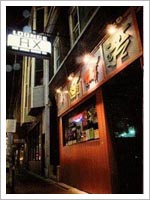By Don Jacobson
A couple things got me thinking about good ol’ Lounge Ax today: the closing of CBGB in New York and the re-opening of the Biograph Theater on Lincoln Avenue as a glittery new hangout for the CSI actor guy. CBGB’s closing, of course, is a replay of that dismal day nearly seven years ago when Lounge Ax gave up the ghost as Jon Langford belted out a few choice Johnny Cash covers on its beloved cramped stage, while the Biograph is right across the street from Lounge Ax’s former space, now occupied by a trendy martini bar with pristine white walls.
 I suppose what this ultimately means is that a) legendary independent music venues are constantly in danger, mainly because their owners are usually cranky iconoclasts who aren’t very much concerned with financial success and so aren’t willing to do what it takes to prosper in big cities where clout and friends in high places are the lingua franca; and b) so are their patrons and the artists who entertain them.
I suppose what this ultimately means is that a) legendary independent music venues are constantly in danger, mainly because their owners are usually cranky iconoclasts who aren’t very much concerned with financial success and so aren’t willing to do what it takes to prosper in big cities where clout and friends in high places are the lingua franca; and b) so are their patrons and the artists who entertain them.
What CBGB was to New York’s formative punk rock scene, Lounge Ax was to Chicago’s indie music heyday of the 1990s. And its demise, I would argue, was more of a blow to this city than CBGB’s is to Gotham. Because, let’s face it, CBGB’s relevance has long since diminished to near zero while when Lounge Ax closed, it was still a vital part of this city’s emerging importance to the entire country’s indie rock culture. Of course, we’ve all become resigned to wailing over gentrification, but the fact that the city played a large part in forcing its shutdown made it that much more of a bitter pill to swallow.
What seemed like purposeful hostility on the part of the city’s License and Liquor Control Commission against owners Julia Adams and Sue Miller both mystified and enraged. It really brought home to me, then a recent transplant to Chicago, what an inscrutable government the city had. What possible reason could it have to pick on an establishment known far beyond its borders as an important cultural institution? Although that question has never been definitively answered, I have a strong suspicion that it was because Lounge Ax represented the wrong kind of culture to City Hall.
And that hurt. It made me feel like I my kind wasn’t wanted here, almost like Richie Daley was carrying on his father’s vendetta against hippies, only instead of the ’60s types that the old man had pummeled with nightsticks, Richie was continuing the tradition in a more insidious ’90s way of targeting the cultural inheritors of the hippies, Generation X slackers, not with the brute force used by Dad at the ’68 Dem Convention, but its modern equivalent – the legal force of zoning codes. The result was the same: the eviction of scruffy, anti-corporate music lovers from an area considered to be of importance to upper-middle class professionals. In other words, a pretty typical tale of gentrification in a city where anyone who makes less than what it takes to qualify for federal tax cuts had best move along.
Also, it probably didn’t help that Adams and Miller weren’t political schmoozers. They were truly independent business owners, not seeking handouts or subsidies, supposedly the kind of entrepreneurs that our political culture sets up to be the bedrock of the economy. They apparently weren’t good enough friends of the local alderman for him to intervene, which shows that it’s still all about who you know in Chicago rather than what kind of intrinsic merit you or yours may have.
So let’s look at what’s going on at Lincoln and Fullerton now. The Biograph Theater, which during the Lounge Ax era was a marginal second-run moviehouse when it wasn’t closed for repairs, has now become the new home for the Victory Gardens Theater after a $12 million capital campaign. It has succeeded in part because it has a key benefactor in mega-TV star and Victory Gardens alumnus William L. Petersen, whose visibility on the highest-rated show in America wowed potential contributors. This is the kind of money it takes to impress the city fathers.
Average ticket price for the new Victory Gardens Theater: $35. Average Martini price at The Gramercy, now occupying Lounge Ax’s old spot: $8. Number of swear words scratched onto walls: None. Pretention threat level: Orange.
So while I mourn the loss of CBGB, I mourn Lounge Ax much, much more, even though the trauma is fading into the mists of time. At least CBGB got to die a somewhat natural death, folding long after it had regressed into being just another music club in terms of cultural importance. Lounge Ax, however, was murdered while at the top of its game, and no truer case of death by gentrification will there ever be.
Posted on October 17, 2006


